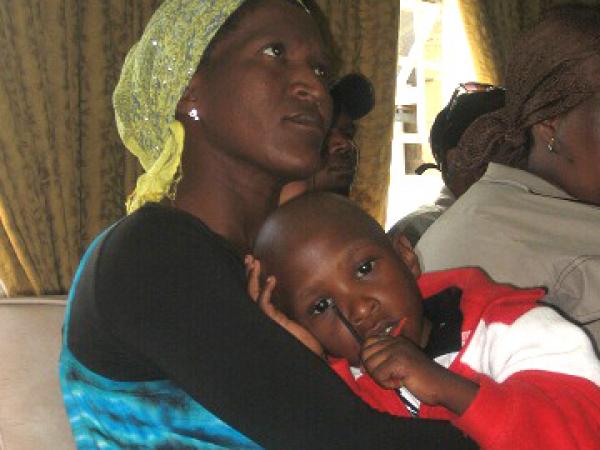

Patricia and Teko (names changed). Photo courtesy of Autism Western Cape.
7 August 2013
Three months ago we told the story of Patricia who raises her autistic son, Teko, in a shack in Khayelitsha. Patricia sometimes ties Teko to a couch for his own safety to prevent him wandering off. We followed up to see if life has become easier for them. [Patricia’s and Teko’s names have been changed.]
Patricia said: “After the story was published a gate was donated [to us]. A week later, the gate was stolen. I had to go back to tying Teko down to the couch to protect him. Autistic children have no sense of danger.”
After being diagnosed, the seven-year-old went to Noluthando School for children with special needs for placement. Unfortunately, he did not qualify.
“After evaluations the school said, they don’t take children with intellectual disabilities,” said Patricia. “So he went back to the special-care-centre he was in, Imizamo Yethu.”
He gets picked up for school at 7am and returns home at different times. Often Patricia still has to leave Teko alone and find ways to prevent him from leaving the house, which includes tying him to the couch.
Helen Hayes, former director at Autism Western Cape, wrote in an email: “I wish we could say he had been given a place at Noluthando School’s unit for children for autism spectrum disorder. Sadly there is a long waiting list. There are several hundred children with autism stuck at home being denied their right to a basic education. Also, I am afraid that when he was reassessed he did not meet the criteria for the unit and hence was referred to a special care centre.”
Currently there are only two public sector autism specific educational facilities, and five Learning, Skills and Employment Network (LSEN) schools with autism-specific units. Together these accommodate less than 300 children. There are long waiting lists at all these facilities, and it can take up to five years from diagnosis to placement. Not only are there too few facilities, but too few professionals with experience.
Autism Western Cape (AWC) tries to help. Janine Chester, the organisation’s director, explained by email a wide range of services offered by her organisation. In Khayelitsha, as part of their outreach programme, they run a monthly workshop at Noluthando School. The organisation met Teko and his mother at one these workshops.
According to AWC’s website, currently about 10 children are being diagnosed at Red Cross Children’s Hospital, Lentegeur and Tygerberg Hospitals every week. Globally about 1% of children have some form of autism. There are likely many unidentified children living with autism in the Western Cape.
Nontyatyambo Primrose Mooi, a Community Development Practitioner with AWC, said, “Accepting that your child is autistic is one of the most difficult things any parent can ever go through … It never gets easier, but having a strong support system from the family, a receiving society and being part of a support group helps. It helped me.”
But Patricia remains distressed: “Our neighbourhood is not safe, and we don’t have a gate at home to lock to be sure he doesn’t wander around. It pains me to have to tie him down, but it’s the only way I can be sure he is safe.”
See How do you look after an autistic child when you live in a shack?
This story has been fact-checked by GroundUp.